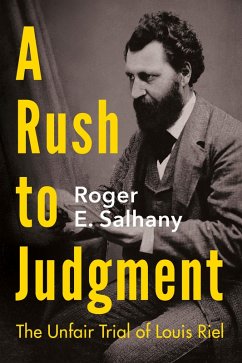Did Louis Riel have a fair trial?
The trial and conviction of Louis Riel for treason in the summer of 1885 and his execution on November 16, 1885, have been the subjects of historical comment and criticism for over one hundred years. A Rush to Judgment challenges the view held by some historians that Riel received a fair trial.
Roger Salhany argues that the presiding judge allowed the prosecutors to control the proceedings, was biased in his charge to the jury, and failed to properly explain how the jury was to consider the evidence of legal insanity. He also argues that the government was anxious to ensure the execution of Riel, notwithstanding the recommendation of the jury for clemency, because of concerns that if Riel was sent to a mental hospital or prison, he would eventually be released and cause further trouble. Salhany compels readers to reconsider Canada's most famous trial in court history.
The trial and conviction of Louis Riel for treason in the summer of 1885 and his execution on November 16, 1885, have been the subjects of historical comment and criticism for over one hundred years. A Rush to Judgment challenges the view held by some historians that Riel received a fair trial.
Roger Salhany argues that the presiding judge allowed the prosecutors to control the proceedings, was biased in his charge to the jury, and failed to properly explain how the jury was to consider the evidence of legal insanity. He also argues that the government was anxious to ensure the execution of Riel, notwithstanding the recommendation of the jury for clemency, because of concerns that if Riel was sent to a mental hospital or prison, he would eventually be released and cause further trouble. Salhany compels readers to reconsider Canada's most famous trial in court history.
Dieser Download kann aus rechtlichen Gründen nur mit Rechnungsadresse in A, D ausgeliefert werden.









